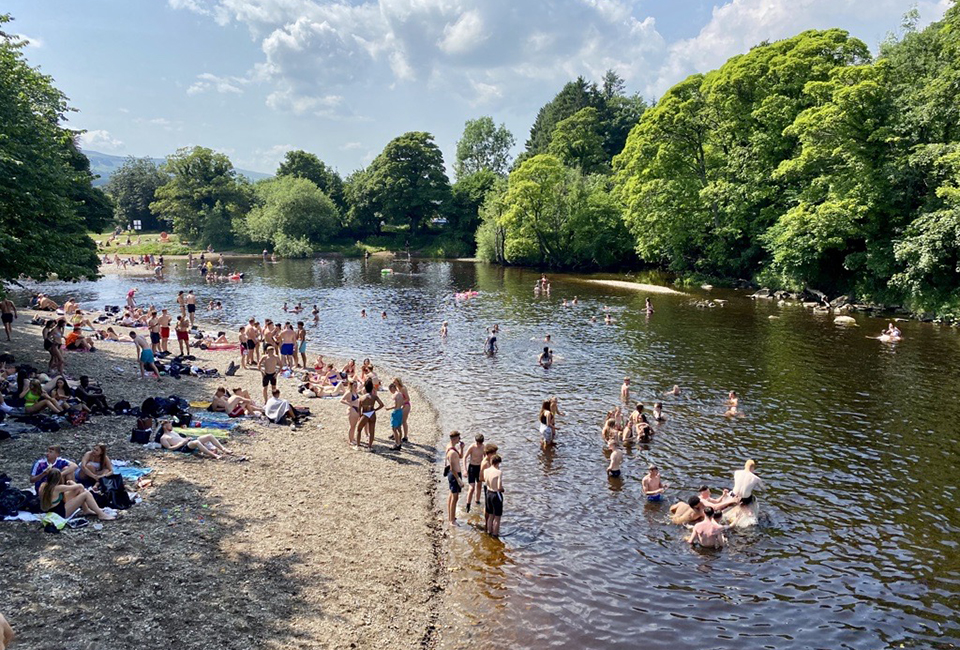Helping Yorkshire's rivers thrive
Everyone at Yorkshire Water want to see our rivers thriving. We know how critical our role is in helping make this happen for our environment and communities. As part of our ongoing river health plan and strategy, we are continuing to improve how quickly and efficiently we respond to any issues along our waterways.
What to do if you suspect river pollution
It’s really important that we know about potential river pollution events as soon as possible to help limit the potential impact on a water course. If you spot one, please let us know using our report a problem form.
Signs of a suspected pollution in rivers, water courses or coastal areas could include:
- The appearance of toilet paper, tissues, wipes, faecal matter, personal care items such as sanitary wear
- A river or stream appearing to look cloudy or milky
- The appearance of soap suds or foam
- The presence of a slimy grey sewage fungus
- Dead or gasping fish
- Noticeable sewage odour.
If you've spotted pollution in a water course, please call us on 0800 138 3484 or report a problem online so that we can investigate as a priority. We will need to know where you saw the suspected pollution, the kind of pollution witnessed, when and if it is still present. We always aim to investigate pollution reports within 2 hours, and report confirmed pollutions to the Environment Agency.
Yorkshire is rich in iron deposits from disused mines which can make the water look orange. This is natural and not harmful. Similarly, sediment moving downstream can make the water look discoloured and cloudy during heavy rainfall. This is also not a pollution, however can be a cause for concern if identified on a dry day or near building developments.
Yorkshire River Watch
We’re working hard to improve the health of Yorkshire’s rivers and we need your help!
If you are part of a formal Rivers Trust, or your action group is already working with our River Health Improvement Team, we’d really like your help with reporting any issues impacting the health of Yorkshire’s rivers along from our assets by using our new Yorkshire River Watch survey using ArcGIS Survey123.
To complete a Yorkshire River Watch survey, you will need to download the ArcGIS Survey123 app from the Microsoft Store, App Store or Google Play Store first. You do not need to create an account or sign in and you’ll only need to do this step once. The survey can be filled in anonymously by selecting ‘Continue without signing in’
Then either click this link or, using the camera of your smartphone, follow this QR code to download the Yorkshire River Watch survey into the app:

Once you’ve done this, the survey will be downloaded into the Survey123 app ready to use whenever you need to.
If you are unable to access the survey through the ArcGIS Survey123 app, click this link Yorkshire River Watch to open the survey as a web form.
You’ll be asked questions about weather conditions, discolouration and odour of the river to help us understand what’s happening. We will need you to make sure the location of the observation is accurate by pressing the ‘target’ symbol on the map, otherwise a default location will be logged and our teams won’t be able to help if there is an issue.
You'll also be able to upload photos, and up to 6 seconds of video, so we can see what you’re seeing.
Try to capture:
- The point you think pollution is entering the watercourse
- Upstream (of the observation)
- Downstream (as far as any impact can be seen)
- A wide view to help us understand the wider context of the impact on the watercourse.
Why is recording watercourse conditions important?
Polluted water can reduce dissolved oxygen and increase ammonia and phosphate levels, which can damage the river environment. The earlier we know about issues on our network, the sooner we can get them fixed.
Concerned about storm overflows in your area?
Storm overflows are an essential part of our sewerage network which relieve pressure at peak flow times to prevent the system backing up and flooding homes and gardens. However we are investing heavily to reduce discharges from our storm overflows and always work within permits provided by the Environment Agency.
View our near real-time Event Duration Monitoring map
By adding reports to our Yorkshire River Watch App, both when you do have concerns or when everything looks healthy, this helps us to build a picture of what to expect along your local waterway, and what is abnormal and therefore needs further investigation.
How else can you help?
- Stop the Block
- Use Watersafe Plumbers. This can help prevent misconnections, which occur when appliances like washing machines or toilets are wrongly plumbed into surface water sewers. This then travels untreated to the rivers through outfalls which cause pollution.
- Report any suspected pollution to 0800 138 3484

